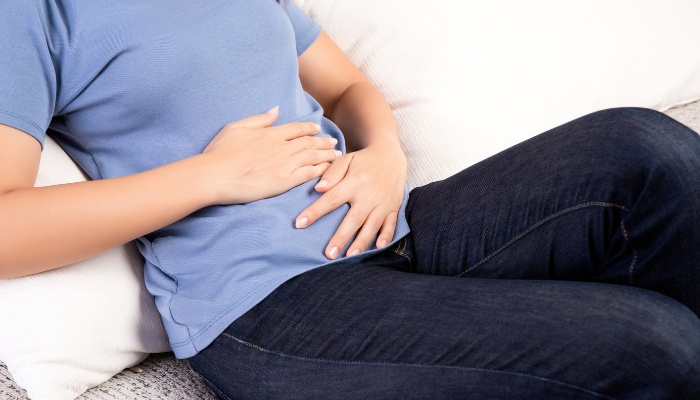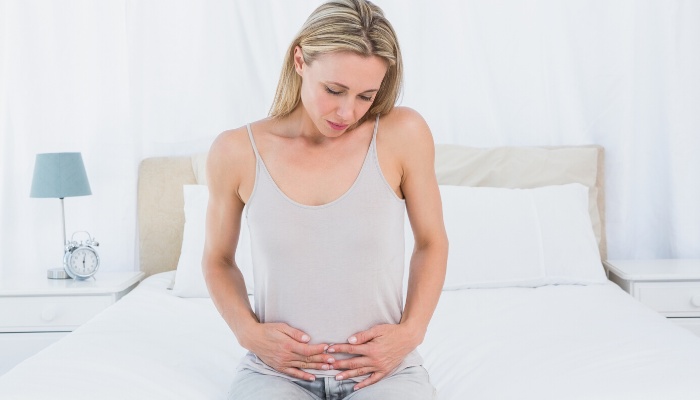Several women may encounter gassiness and bloating during their ovulation period.
This is due to fluctuating hormone levels that slow digestion and produce extra gas.
The gas and bloat can begin a few days before ovulation and may linger for several days.
However, your gas might be unrelated to ovulation.
According to the Cleveland Clinic, the most common causes of gas include:
- Behavioral factors, such as swallowing air while chewing, drinking, and talking.
- Consuming too many gas-producing foods (beans, potatoes, corn, onions, apples, and high-fiber products).
- Digestive problems, such as irritable bowel syndrome (IBS), lactose intolerance, and celiac disease.
- Intestinal infections, such as giardiasis.
- Medications or motility disorders that slow the bowels, such as IBS, diabetes, and scleroderma.
Table of Contents
Gas and Bloating During Ovulation
You’re finally over the annoying period bloat and starting to feel like your normal self again, until the bloat creeps right back a week or so later.
Hello, ovulation. Welcome back.
On average, ovulation occurs on day 14 of a 28-day cycle.
It is common to experience bloating for a few days leading up to actual ovulation, perhaps beginning around day 11.
This is due to rising estrogen levels wreaking havoc on your digestive tract and causing water retention.
Right before you ovulate, there is a surge in your estrogen and luteinizing hormone (LH) levels.
These hormonal changes can induce water retention and swelling, along with potential disruptions in the gastrointestinal tract, leading to gas and bloating during the ovulation phase.
When To Worry
If your ovulation symptoms seem to be just as or more severe than your PMS symptoms, it may be time to pay attention.
Consult your doctor if you experience any of the following during ovulation:
- Prolonged bloating and pelvic pain
- Heavy bleeding during ovulation
- Painful periods
- Pain with intercourse
- Pain with bowel movements or urination
- Infertility
Trapped Gas During Ovulation
Gas pains are another common and uncomfortable symptom of ovulation.
Rising progesterone levels during ovulation cause slowed digestion, increased gas, and constipation.
Can Ovulation Feel Like Gas Pains?
While most women do not feel anything during ovulation, others may experience symptoms that let them know exactly when they are ovulating.
Ovulation pains have been described as a dull cramp or a sharp, sudden twinge on either the right or left side of the abdomen, depending on which ovary is releasing the egg.
It is possible that the twinge may resemble the feeling of gas pains.

Ovulation Bloating vs. PMS Bloating
For most women, ovulation and PMS bloating feel the same. The only way to differentiate between the two is by tracking your monthly cycle.
Ovulation bloating occurs in the middle of your cycle while premenstrual bloating appears about a week before your period.
Other symptoms will likely accompany PMS bloating such as abdominal cramping, breast tenderness/fullness, fatigue, headaches, and mood swings.
Ovulation bloating is usually relatively mild compared to premenstrual bloating and is typically gone in a few days’ time.
Ovulation Bloating vs. Early Pregnancy Bloating
Ovulation typically occurs around the middle of the menstrual cycle, approximately 14 days before the start of the next menstrual period.
Ovulation bloating is usually a short-term symptom, lasting a few days around the time of ovulation.
Women may experience other signs of ovulation, such as increased cervical mucus, a slight increase in basal body temperature, and mild pelvic discomfort on one side.
Bloating during early pregnancy occurs after conception and implantation of the fertilized egg into the uterus.
It typically starts a week or two after conception and can persist for several weeks.
Early pregnancy bloating is related to hormonal changes, particularly the rise in progesterone levels.
Progesterone can cause relaxation of the smooth muscles in the digestive tract, leading to slowed digestion and increased gas.
Early pregnancy bloating may be accompanied by other early pregnancy symptoms, such as breast tenderness, fatigue, mood swings, and a missed period.
How To Reduce Bloating & Gas During Ovulation
While bloating may be inevitable during ovulation, there are some things you can do to minimize it or at least make sure that it doesn’t overstay its welcome.
- Diet – High-potassium foods such as bananas, asparagus, and tomatoes can help promote a good fluid balance to counteract the water retention caused by hormones. Protein is another safe bet.
- Avoid foods that cause gas such as broccoli, beans, cabbage, and cauliflower.
- Avoid carbonated or sugary drinks.
- Try probiotics and magnesium supplements to support gut health.
- Eat natural diuretics such as cucumbers and pineapple.
- Take anti-gas medication.
- Exercise – Even if it is the last thing you want to do, movement during ovulation can help to reduce the annoying bloat by getting things moving in your digestive tract.
- Relax – Stress can make bloating worse, so manage stress by incorporating relaxation techniques such as meditation and yoga into your routine.
- Track your cycle – Predicting when you will ovulate can allow you to take proactive measures to combat the gas and bloating.
Common Ovulation Bloating Experiences
Not every woman will notice bloating or gassiness during ovulation, and those who do will often have symptoms that vary widely from one woman to another.
Extreme Bloating During Ovulation
Some women hardly notice bloating during ovulation and may not even realize they are ovulating.
Other women may experience severe bloating and discomfort, similar to a second period without the bleeding.
If you are concerned about your bloating, speak to your healthcare provider.
It is possible that there are other underlying medical conditions (such as PCOS, endometriosis, or an ovarian cyst) intensifying the bloating.
Endometriosis Ovulation Bloating
Endometriosis is a chronic disorder in which uterine tissue grows outside of the uterus.
It can cause severe pelvic pain and discomfort at any time, but it tends to get worse around the time of ovulation and during your menstrual period.
Endometriosis can make ovulation bloating worse and can cause more painful symptoms such as abdominal cramps and bleeding during ovulation.
PCOS Bloating During Ovulation
Women with PCOS often have irregular cycles and do not ovulate or bleed predictably each month.
However, bloating is a very common symptom of PCOS regardless of whether a woman is ovulating or not.
Without normal ovulation and an increase in progesterone, estrogen levels may remain elevated and cause severe bloating.
Ovulation Bloating and Pain
Compared to the bloating and pain experienced during your period, ovulation bloating should be relatively mild and painless.
The following are normal ovulation symptoms that a healthy woman (one who has not been diagnosed with another medical condition affecting ovulation) can expect:
- Mild bloating lasting a few days
- Gas pains
- Breast tenderness
- Mild pelvic or abdominal pain (less than PMS)
- Light spotting or discharge
Bloating After Ovulation
Unfortunately, sometimes bloating may linger after ovulation.
Between ovulation and menstruation bloating, we can’t really catch a break! We have a little hormone called progesterone to thank for that.
After ovulation, progesterone levels ramp up to prepare for a possible pregnancy.
Progesterone is known for causing slowed digestion and bloating.

Bloating After Ovulation — Am I Pregnant?
Suppose you have been tracking your cycle, and you know you ovulated recently.
However, you still feel bloated even though ovulation was several days ago. Being pregnant is certainly a possibility.
If you conceived this cycle, your body will be ramping up the levels of progesterone to support pregnancy, which usually causes some bloating and gas.
While bloating can be one of the first signs of pregnancy, it is also a symptom of several other things.
The best way to know for sure if you are pregnant is to take a pregnancy test around the time of your expected period.
Gassy After Ovulation
You may remain a little gassy for the days following ovulation as your hormone levels and GI tract return to normal.
Try to give yourself a little bit of grace during your entire fertile window surrounding ovulation as there is a lot going on from the waist down during that time.
Smelly Gas After Ovulation
Not only will you notice more gas during ovulation, but you may also notice that it is stinkier than usual.
This is likely due to the slowed digestion which gives food and bacteria more time to ferment in your colon, resulting in extra smelly gas.
While extremely unpleasant, it is normal and not a cause for concern.
Other Ovulation Symptoms You May Experience
While many women do not realize they are ovulating, there are a number of symptoms that you might experience including:
- Change in cervical mucus to an egg-white consistency
- Rise in basal body temperature
- Pain on one side of your lower abdomen (mittelschmerz)
- Breast tenderness
- Abdominal cramping
- Nausea and/or dizziness
- Libido changes
- Changes in the cervix
Charlynn is an educator and mom to fraternal boy/girl twins. She loves learning through the experiences she has with her littles and using her knowledge to help other moms as they embark on the journey of motherhood.

